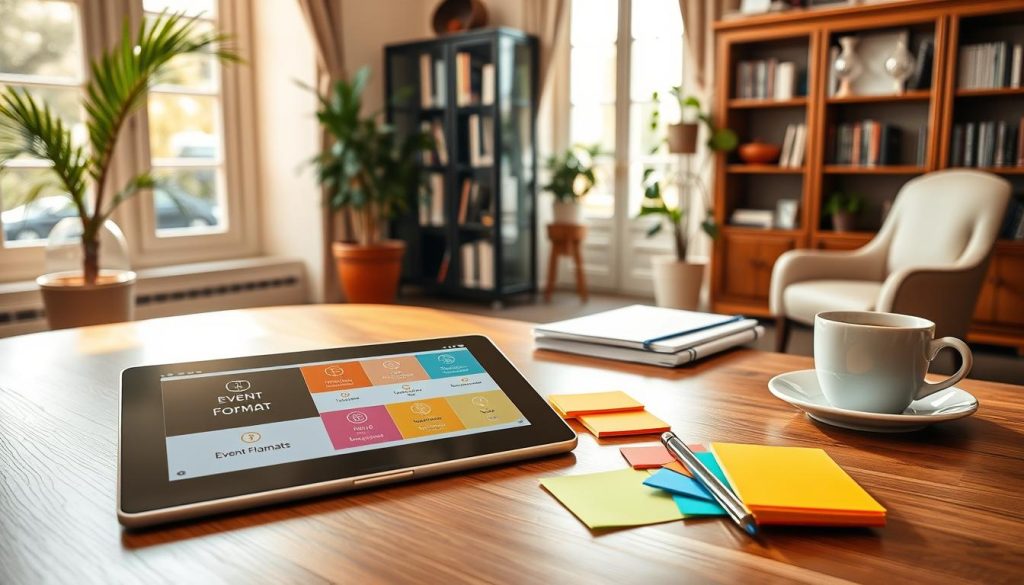Ready to grow your professional circle in France? This short guide shows where to find the best meetups, conferences, and workshops and how to turn brief introductions into real outcomes.
Whether you work in tech, design, or small business, these gatherings bring professionals together to share ideas and build connections. Expect formats from large conferences with keynote talks to intimate workshops and casual meetups that help you learn quickly.
Conferences often cost more and run several days with seminars and expo halls. To cut costs, ask your employer to cover fees, volunteer, attend one day, or join an online version.
We’ll cover where to find high-quality options across France, what format fits your schedule, and simple steps to prepare, attend, and follow up so you can meet people with purpose.
Table of Contents
Key Takeaways
- Mix large conferences and small workshops to learn and meet people fast.
- Use online or hybrid formats to save time and extend reach.
- Cut costs by volunteering, asking your employer, or choosing a single day.
- Prepare a concise intro and a clear follow-up plan for better results.
- Focus on quality connections that lead to practical business opportunities.
Why France Is a Hotspot for Professional Connections Right Now
Regional hubs in France host recurring gatherings that help companies and people exchange ideas fast. These multi-day professional conferences connect thousands people in a single place, with keynotes, expo halls, and focused seminars that boost learning and visibility.

Chambers of commerce and industry groups build a steady community of recurring attendees. That continuity makes it easier to form long-term connections that support business growth and career mobility.
Many gatherings cluster around innovation, tech, sustainability, and creative sectors. They attract professionals looking for mentorship, job leads, and practical advice.
« Showing up to the right session can turn a quick hello into a real business opportunity. »
Employers now often sponsor attendance or let people volunteer to cut costs. Hybrid schedules also help professionals balance travel, budget, and ongoing learning.
- Plan around high-impact windows like spring and post-holiday seasons.
- Evaluate attendee lists and session themes to match your business goals.
Types of networking events to try in France
From big stages to small tables, the format you pick shapes the outcome. Choose formats that match your goal: visibility, skills, hiring, or local ties.

Professional conferences
Multi-day conferences bring thousands people, top speakers, and expo halls. They are ideal to learn trends and form high-value connections fast.
Industry seminars and roundtables
Smaller sessions focus on deep knowledge and Q&A. For example, an accounting seminar may cover new standards, software, and regulatory updates.
Workshops and speed formats
Workshops pair hands-on activities with skill-building so you leave with usable knowledge and new contacts formed through shared problem-solving.
Speed formats force concise intros and quick follow-up plans. They help you meet several participants in minutes.
Career fairs, trade fairs, and casual meetups
Career fairs connect job seekers with hiring teams; bring resumes and a brief pitch to make an immediate impression.
Trade fairs show company products in expo halls, where demos spark supplier deals or pilot projects. Casual meetups like work breakfasts and alumni gatherings keep local ties strong.
Webinars and hybrid options
Virtual formats save travel and budget while offering private chats, social lounges, and digital business cards. Mix large, small, and online formats across the year to balance visibility, practice, and pipeline-building.
Where to find events happening near you
Start your search on city-focused platforms that list meetups, workshops, and professional gatherings nearby. These sites make it easy to filter by theme, date, and location so you only see the most relevant options.

Use Meetup and similar platforms to join groups and discover activities
Meetup offers city-based discovery for everything from casual meetups to skill-sharing sessions designed for professionals. Join a few groups to get daily listings and suggestions tailored to your interests.
Check city calendars, chambers of commerce, and professional associations
City sites and local chambers post recurring breakfasts, workshops, and talks that attract company leaders and hiring managers. These listings often include concrete information like agendas and expected audience size.
Leverage LinkedIn, Eventbrite, and Facebook groups for targeted opportunities
Use Eventbrite filters for « Business » or « Networking » and set alerts so new listings land in your inbox. On Facebook, join industry groups and check the Events tab; then cross-reference LinkedIn to see which professionals plan to attend.
« Personal referrals and a quick spreadsheet beat endless browsing—focus on quality over quantity. »
- Ask friends and colleagues for warm introductions to niche meetups.
- Look for listings that mention recruiter booths if you want to boost your job search.
- Build a simple tracker to compare platforms, dates, locations, and costs.
For more local ideas, discover upcoming meetups near you to start planning which gatherings fit your career and business goals.
Choosing the right event format and timing
Choose a format that fits your goal—deep relationship building needs a different setup than quick learning.
There are three primary formats to consider:
- In-person: best for rapport, spontaneous hallway conversations, and partnerships.
- Online: cost-effective and ideal for catching talks from abroad or many speakers.
- Hybrid: combines live access with recordings for flexibility when travel is hard.

Match format to outcome and daily rhythm
If your aim is enterprise sales or strategic partnerships, prioritize face-to-face meetings. If you want to absorb expert knowledge fast, pick an online or hybrid agenda with recorded sessions.
Think about your energy too. Morning breakfasts suit focused conversations. Evening meetups offer a relaxed vibe for informal introductions.
| Format | Best for | Timing | Accessibility notes |
|---|---|---|---|
| In-person | Partnerships, demos, rapport | Daytime or evening | On-site accessibility varies; plan travel |
| Online | Knowledge, panels, wide reach | Flexible, recorded | Captions and recordings help replay |
| Hybrid | Mix of outreach and learning | Multi-day options common | Choose passes with recordings |
Practical tip: Use a monthly schedule that blends one large gathering, one skill workshop, and one casual meetup. Pre-book 1:1s and pick sessions with targeted attendees so your time converts to measurable connections.
For local listings that match format and timing, discover upcoming meetups near you.
Prep like a pro: pitch, business cards, and essentials to bring
Being ready with a crisp pitch and the right materials makes every conversation count.
Preparation reduces stress and improves clarity. Rehearse a short script so your message lands fast.
Craft a tight elevator pitch
Write a 30–45 second pitch that states your first and last name, role, key result, and the problem you solve.
Rehearse until it sounds natural. Prepare versions for buyers, hiring managers, and peers.
Bring business cards and fast contact options
Print cards with mobile, email, and LinkedIn. Carry digital cards or a QR code for quick exchanges when lines form.
At career fairs, tuck extra resumes into a slim folder so you can hand one over without fuss.
Plan outfit and materials
Choose smart casual with a blazer option for a polished look between sessions and socials.
Pack an essentials kit: cards, pen, small notebook, portable charger, breath mints, and one-pagers for key audiences.
Set measurable goals and a simple process
- Goal examples: five qualified conversations, one speaker question, two follow-ups.
- Draft three open-ended questions to spark meaningful talk.
- Map your process: review attendees, shortlist targets, schedule quick coffee chats, and block time next day for follow-ups.
- Use a simple scorecard to note relevance, next steps, and a memorable detail for each contact.
« Pitches should not be improvised; strong pitchers rehearse a clear structure to improve comprehension. »
For more practical strategies to make connections and follow through, see networking made easy.
On the day: activities, questions, and strategies that make connections
Plan your day like a short mission: pick three goals, a few target companies, and when you will follow up. This keeps you focused and makes each conversation count.
Speed rounds and group activities
In speed formats, open with a concise pitch, ask one targeted question, and confirm a next step before the bell. Ten-minute chats work well to surface shared value fast.
Join group activities early. Roundtables and collaborative tasks make you memorable for ideas rather than just a card exchange.
Ask good questions and listen
Use thoughtful prompts like “What problem are you focused on this quarter?” or “Which session changed your thinking today?” Listen, use the person’s name, and repeat a key phrase they used. This signals attention and builds rapport.
Work the room with balance
Alternate time between speakers, company booths, and open zones so you don’t miss chance conversations. If a meetup area is noisy, suggest a quick coffee for a calmer chat.
- Share one specific example when praising a company, then ask who handles partnerships or hiring.
- Take a two-line note after each contact: topic, promised action, and best channel.
- Close politely: thank them by name and confirm the agreed next step.
For more practical follow-up methods, see networking made easy.
After the event: turning contacts into opportunities
A fast follow-up turns a brief intro into a real opportunity if you act within two days. The goal is to remind the person who you are, reference a specific point from your chat, and suggest one clear next step.
Follow up by email or LinkedIn with context and a clear next step
Send a concise email within 24–48 hours that notes where you met and one detail you discussed. Propose a specific follow-up, such as a 15-minute call next week.
Personalize LinkedIn requests with a short reminder and a value hook. Share a helpful resource, an intro, or a one-paragraph idea that matches the company need they mentioned.
Organize contacts, notes, and information to keep mind and process clear
Store contacts in a simple CRM or spreadsheet and tag by event, company, and priority. This lets you batch messages and avoid duplicate outreach.
- Block time the day after the meetup to send messages, connect on LinkedIn, and schedule calls while momentum is high.
- For job or career goals, attach a short sample or tailored note that matches the professional’s request.
- Use a light touch with friends and warm intros: thank them and keep them updated when an opportunity moves forward.
- If a lead goes quiet, send one helpful follow-up a week later, then set a reminder to check back later.
« Momentum fades fast — quick, relevant follow-ups convert introductions into opportunities. »
Track what worked: note best sessions, strongest contacts, and follow-up conversion to refine your process before the next meetup. Celebrate small wins—each helpful tip, call booked, or warm intro compounds into bigger opportunities over time.
For more practical follow-up templates and tips, see networking made easy.
Conclusion
Close each opportunity by mapping one clear next step and sending a short follow-up within 48 hours. Repeat this playbook, and you will turn chance conversations into measurable outcomes.
Recap the roadmap: pick the right format, prepare a crisp pitch and goals, engage actively during the session, and follow up fast to convert interest into action. Try a mix of a conference, a hands-on workshop, and a local meetup to cover learning, outreach, and relationship care.
France’s steady calendar of high-quality networking events makes it easy to stay visible, learn, and grow your business and career. Pick one networking event this month and run the playbook end-to-end—consistent effort wins more opportunities than occasional big swings.
FAQ
What types of professional gatherings should I try in France?
France offers many formats: large conferences that connect industry leaders, focused seminars and workshops that boost skills, career and trade fairs for hiring and product demos, and casual meetups like happy hours or alumni breakfasts for local ties. Also consider webinars and hybrid sessions to save time while still meeting new people.
Where can I find relevant meetups and activities near me?
Start with platforms like Meetup, Eventbrite, and LinkedIn Events. Check city calendars and your local chamber of commerce for business listings. Professional associations and Facebook groups often post niche opportunities and volunteer-led gatherings tailored to specific industries.
How do I choose the right format and time for my goals?
Match the format to your objective: go in-person for stronger rapport, online for convenience, or hybrid to do both. Pick morning breakfasts for focused conversations and networking before the day starts, or evening meetups for relaxed chats and social connections.
What should I prepare before attending a gathering?
Prepare a concise pitch that includes your first and last name and explains your value. Bring business cards and have a digital contact method ready, like LinkedIn. Plan a professional outfit and set clear goals: number of new contacts, knowledge to gain, or companies to meet.
How can I make the most of short interactions like speed networking?
Use a tight opening line, listen actively, ask one or two thoughtful questions, and repeat the person’s name. Keep answers focused on benefits and follow up by noting key details immediately after the interaction so you can follow up with a personal message.
What are good questions to ask at panels, roundtables, or workshops?
Ask about practical takeaways, tools they recommend, or common pitfalls in their work. Inquire how their experience applies to your situation and what trends they expect next. These questions show curiosity and create natural follow-up opportunities.
How should I follow up after meeting someone?
Send a LinkedIn connection or brief email within 24–48 hours that reminds them where you met, mentions a specific point from the conversation, and proposes a clear next step—coffee, a short call, or sharing a relevant article. Keep it helpful and concise.
How do I organize contacts and notes after an event?
Use a simple spreadsheet or a contact manager to log names, titles, company, where you met them, and one key detail to personalize follow-up. Tag contacts by potential opportunity—mentorship, hiring, partnership—so you can prioritize outreach later.
What etiquette should I follow when approaching speakers or company reps?
Approach politely after their session, reference a point they made, and limit your initial ask to a quick question or permission to connect. Speakers are more receptive to meaningful comments than long pitches, so be respectful of their time.
How can I turn casual connections into real opportunities?
Convert conversations into value: share a helpful resource, introduce mutual contacts, or suggest a concrete next step with a date. Stay consistent with follow-ups and keep interactions focused on solving a problem or advancing a shared interest.





